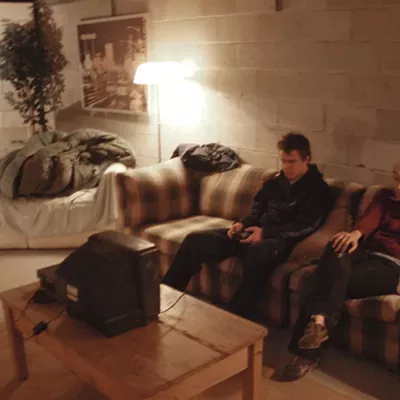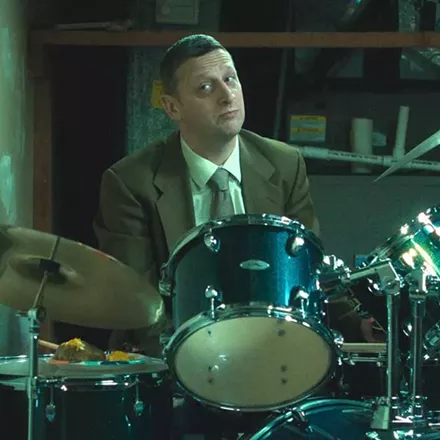The man's wife comes home, finds him on the couch, is told what happened, and gets him to an ophthalmologist, who insists that the man's eyes are perfect. He can't understand what could be wrong.
The man wishes blindness upon the guy who stole his car -- and gets his wish. Then the doctor goes blind, as do all of the patients who were in his waiting room.
Blindness is a horror film without the standard monsters. Adapted by Don McKellar (who also plays the car thief) from the novel by Jose Saramago, it gives us a "what if" scenario: What if there were a plague of blindness?
Taking place in an unrecognizable, unnamed city (most of the film was shot in Sao Paulo, Brazil), and focusing on a small group of characters who never provide us with their names, Blindness depicts a government that announces a "state of crisis" and orders that all afflicted people be rounded up (by menacing men in hazmat suits) and quarantined in an abandoned mental hospital. With only regular food drop-offs from the government, they're left to fend for themselves.
Directed by Fernando Meirelles, who also gave us the excellent City of God and the over-praised The Constant Gardener, the story shows how the first handful of people we've met start learning how to get by, only to have their little world shattered when more and more blinded, panicky people are dropped off and shoved inside.
Trailers for the film are misleading viewers. Let's just say that Julianne Moore's character is free from the plague in one way but trapped by it in another.
McKellar's script prunes a few sequences from the novel and adds a multicultural sense to the group, but sticks close to the basics of the book. Comparisons can be made to other book-film adaptations, such as The Day of the Triffids, in which people go blind and are attacked by killer plants, and Lord of the Flies, in which a group of boys shipwrecked on an island start to ape a society gone mad.
The society in Blindness goes mad on both sides of the (literal) fence. The situation turns hellish in the wards when one blind man with a gun (Gael Garcia Bernal) decides he's going to be king. And the sighted people on the outside are armed and ordered to shoot anyone who tries to escape. Both book and film suggest that anarchy can quickly occur anywhere.
The story ends up being as much about the doctor's wife as it is about everyone who's lost their sight. In such circumstances, evil and good are no longer black and white, but gray.
Following suit, Meirelles gives the film a washed-out look and regularly lets the screen flash to white as yet another person goes blind. Frustration and fear become a way of life on the inside. And then, with the outside world eventually forgotten because of bullying by the "king," a situation that's already awful gets much worse.
The battle lines are drawn: community and family may be valued, but chaos is always just around the corner. When moral blindness sets in, a hopeful outcome can only be hard-won.
BLINDNESS
Rated R
Directed by Fernando Meirelles
Starring Julianne Moore, Mark Ruffalo, Gael Garcia Bernal, Danny Glover



















